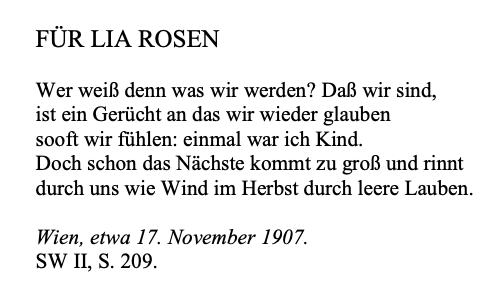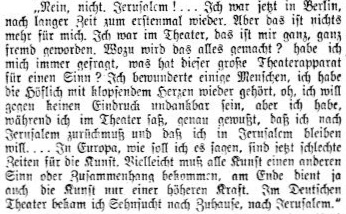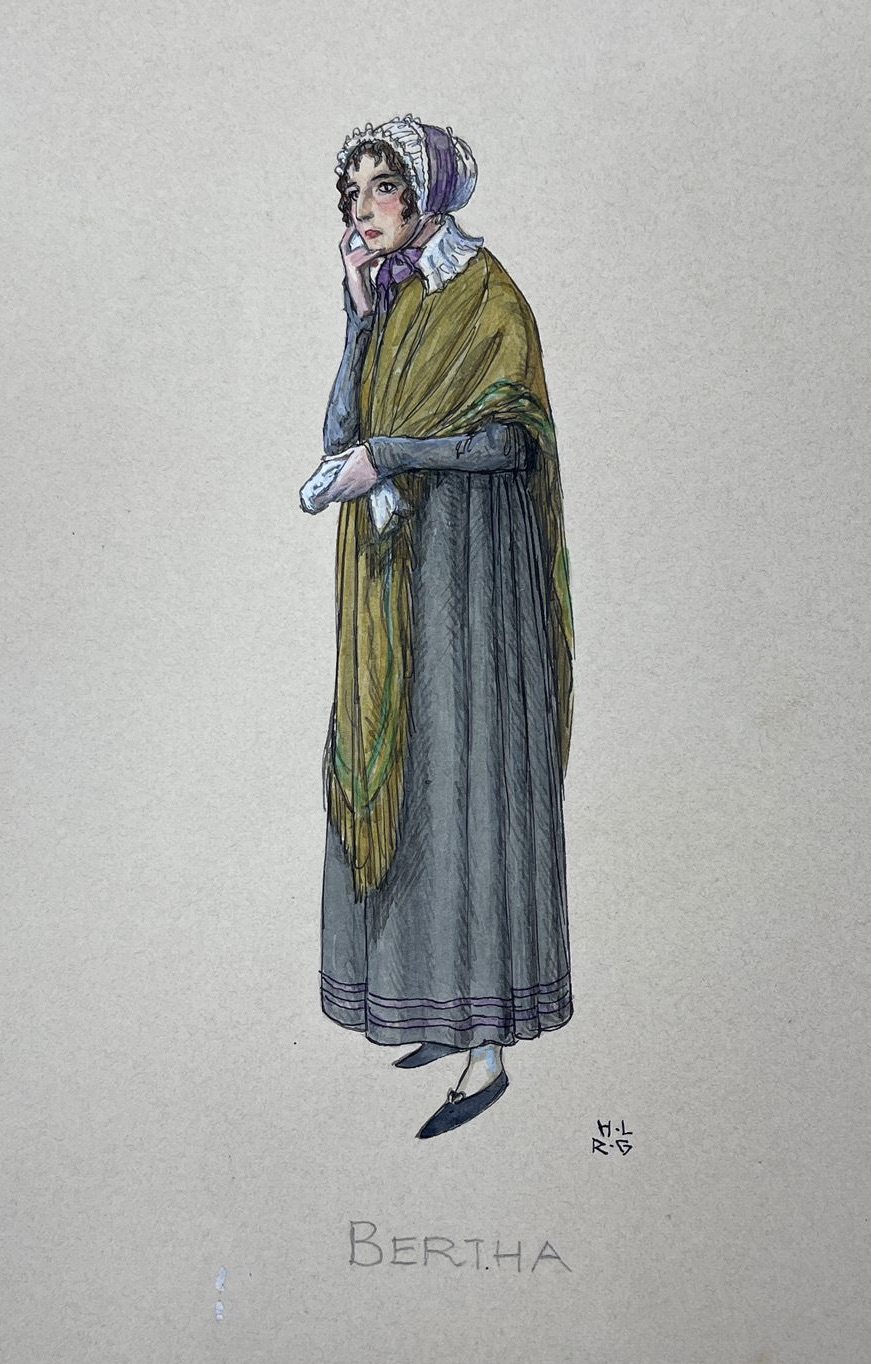New York, 11 March 1925
Lia Rosen in New York ! ! !
Jennifer Rotter and Anna Nimmervoll
in conversation with Lia Rosen
![[Translate to English:] Ein historisches Schwarz-Weiß-Porträt einer jungen Frau mit lockigem Haar und einer Blume an ihrer Schulter. Unten auf dem Foto steht "Marie Mertens - Photograph-Kunst-Atelier 'Moderne' in Wien."](/fileadmin/user_upload/Lia_Rosen_Header.png)
Our reporters met former child star Lia Rosen in New York. Now the talented actress talks about her successful career on the international stage of the arts.
A Familiar Name in the Dreamlands of the United States
After a quiet crossing overseas, we set foot on American soil, that promising earth that binds the hopes of many international daredevils who all too bravely seek their fortune in the distance. As we wandered through the bustling streets, our eyes were drawn to a flyer with an unmistakable name on it: Lia Rosen gives Bible readings in New York! Without an ounce of hesitation, we made our way to the event. As we sat in the hall, Rosen’s vocal power shook the American audience with the sound of the Psalms, the Song of Songs, and the story of Samson and Delilah.
g
We couldn’t hold ourselves back – after the performance concluded we had to ask the artist for a quick interview, which she graciously granted. Lia Rosen took us to one of the cafes which she used to frequent. We sat at a table in the corner of the room, her petite form facing us, reminding of the girl who once held our Burgtheater in awe.
A Child Star Rises to Greatness on Vienna’s Stages
Even as a child, Lia Rosen captivated the Viennese audience. After her outstanding debut at the Viennese Burgtheater in 1907 – it should be noted that the young Rosen excelled in three different roles during that season – the theatre could hardly be imagined without her. During her time she played the most famous children’s roles from the repertoire of historical and contemporary stage works. However, as she tells us, after artistic discrepancies in 1911 she had to submit her resignation to the Burgtheater management with a heavy heart. After the 1912 season was over, Lia Rosen was lost to Berlin and to Max Reinhardt, to the great regret of Viennese art lovers.
On the Paths of Success: From Berlin to New York
In addition to her commitment to the theatre, Rosen tried to keep up with the times by contributing her talent to the world of film. Der Shylock von Krakau (‘The Shylock of Kraków’) was unforgettable and warmly welcomed by the eager film audience in 1913. We admire all those who saw the film at that time; we ourselves, to our great regret, were deprived of it.
h
![[Translate to English:] A historical newspaper clipping in German advertising the guest performance of "Der Shylock von Krakau" with Rudolf Schildkraut. The mime drama was written by Felix Salten and directed by Carl Wilhelm](/fileadmin/user_upload/Neues_Wiener_Tagblatt__Tages-Ausgabe__22.11.1913_Werbung_zum_Film_Der_Shylock_von_Krakau_Lia_Rosen.jpeg)
Source: ANNO/Austrian National Library
![[Translate to English:] Ein historisches Programmheft des "Bayes Theatre" auf Englisch. Das Heft bewirbt ein Stück mit dem Titel "THE DYBBUK", beschrieben als "A Dramatic Legend in Four Acts" von S. An-sky. Es werden auch die Hauptfiguren des Stücks und ihre Darsteller aufgelistet.](/fileadmin/_processed_/1/4/csm_Playbill_The_Dybbuk_Lia_Rosen_0192b90d0e.jpg)
© Playbill
According to Rosen, it was in Berlin that she had her fateful meeting with the Moritz-Schwartz-Truppe (‘Moritz Schwarz Troop’), who eventually brought her to New York. America welcomed Lia Rosen with open arms. She gave Bible lectures, as she had done in Vienna, and is currently enjoying a triumphant success in Der Dybbuk (‘The Dybbuk’). It may come as no surprise that Lia Rosen is a great asset to New York’s Jewish theatre scene. Lia Rosen herself is wholeheartedly devoted to this country and talks about her life in the United States of America with great enthusiasm.
Great Perspectives in Her Private life as Well?
Lia Rosen speaks freely about her acting career but keeps a low profile when it comes to private matters. New York’s gossip says that she has a loving attachment to a certain man. These rumours persist. When asked, we see the mischievousness in Lia Rosen’s expressive, childlike face. She does not deny it. She already has plans for the future, she tells us. She is going on a trip in the near future, she adds meaningfully. No matter how these prospects turn out, we wish Lia Rosen the best on her way and hope to be able to report on her successes in the future.
‘Rosen has talent – it is so great that it literally bursts out of the little person.’
t
Wiener Hausfrauen Zeitung, 1907
Lia Rosen
born 1893, Braila
died 1 September 1972, Tel Aviv
Biography
‘Dear Princess Lia Rosen [...] Many beautiful stars are sent to you by Else Lasker-Schüler.’ These lines were written by the poet Lasker-Schüler (1869–1945), under the pseudonym ‘Prince Jussuf of Thebes’, to Lia Rosen, one of the great stage stars of her time.
Lia Rosen’s origins are unknown. It is believed that she was born around 1893 in Romania in the village of Braila in poor circumstances. She first attracted wonder and people’s interest when she was just a child. Her father, a peddler, brought her to her first theatre audition with the request to further and nurture her talent. The child was considered to have tons of it, and from the young age of five she belonged to the children’s choir of the Hofburgtheater. She subsequently received support with a two-year course of study at the Vienna Conservatory with Alexander Römpler (1860–1909). For a year she went on to volunteer under Max Reinhardt (1873–1943) at the Neues Theater in Berlin and received engagements at the Kleines Theater and the Hebbel Theater, both also in Berlin.
This was followed by an invitation to the Burgtheater in Vienna, where she was engaged to guest star in three roles: Ottogebe in Hauptmann’s Der arme Heinrich (‘Poor Henry’), the title role in Hannele (‘The Assumption of Hannele’), and Hedwig in Ibsen’s Die Wildente (‘The Wild Duck’). Lia Rosen became the child star of the Vienna Burgtheater, appearing in a variety of other roles before she submitted her request for dismissal in 1911 and left the house in 1912.
Lia Rosen exerted a fascination on her audience. Descriptions in articles and reviews repeatedly highlighted her childlike figure, which captivated the audience with vocal power and talent. ‘She has the body of a child. The voicelessness of a little-developed private person. And the shaking power of a prophet. A small, motionless, plump face; dark hair; she seems to be fourteen years old; [...] She calls herself Lia Rosen,’ wrote the German theatre critic Alfred Kerr (1867–1948). This is how Lia Rosen was perceived by her contemporaries: a child of eternal youth.
g
Lia Rosen returned to Berlin and worked again with Max Reinhardt. In 1913, she starred in her first, and now lost, film, Der Shylock von Krakau (‘The Shylock of Kraków’). Three years later, she appeared in a guest performance in Vienna in Else Feldmann’s play Der Schrei, den niemand hört (‘The Cry That No One Hears’). In 1924, Lia Rosen got a two-year contract in New York and joined the Morris Schwarz Troop and the Yiddish Theater. The following year she married the engineer Max Schwartz (life dates unknown), a Zionist with whom she emigrated to Palestine. Lia Rosen turned away from acting on stage and dabbled with the talkie, but her interest was focused elsewhere. Driven by the belief in the ‘artistic inspiration’ of Palestine, Lia Rosen envisioned biblical festivals at the Mount of Olives during the Easter season, which she wanted to realize with Yemeni Jews. Lia Rosen lived in Tel Aviv until her death in 1972.
What remains?
k
‘I knew exactly that I had to go back to Jerusalem and that I wanted to stay in Jerusalem. … In Europe, how shall I put it, these are bad times for art.’
Excerpt from ‘Begegnung mit Lia Rosen’, see below
In 1925, Lia Rosen married in New York. Her husband, Max Schwartz, was an engineer and a Zionist. In the wake of her marriage, Lia Rosen turned away from her artistic career on the international stage, and moved her life to Jerusalem. As Mrs. Schwarz, she settled down and led a relatively quiet life in Tel Aviv. Lia Rosen turned away from Europe for good. She ruled out a return; the only place she considered worth living was the tumult of New York or the ‘monastery’ of Jerusalem.
The move from New York to Jerusalem in the late 1920s marked a turning point in Lia Rosen’s life. Her presence in the German press diminished significantly after 1930. Her name was mentioned only in passing, in connection with revivals, referring to the past successes she had had with her roles as a child actress in Vienna. Her name appeared one last time in the Neues Wiener Tagblatt on 4 September 1935. After that the name Lia Rosen disappeared completely from the German-language media.


Source: ANNO/Austrian National Library
Even after the time of National Socialism, the name of Lia Rosen was not considered of interest in the German-speaking world. Lia Rosen herself no longer performed on theatre stages and regretted her lack of Hebrew skills. Instead, she gave acting lessons, held biblical readings, and gathered a large circle of artists and scholars around her. Lia Rosen was driven by the idea of establishing an intellectual centre in Jerusalem, where she could bring together artists, scholars, and philosophers. Her second heartfelt project was the implementation of biblical festivals during the Easter season at the Mount of Olives in Yemen. Lia Rosen lived in Tel Aviv until her death in 1972.
‘No. Jerusalem!… I was in Berlin, for the first time again after a long time. But that is no longer for me. I was in the theatre, which has become quite, quite strange to me. What is all this for? I have always asked myself, what is the point of this great theatre apparatus? I admired some people, I listened to them politely again with a beating heart, oh, I don't want to be ungrateful against any impression, but while I was sitting in the theatre I knew exactly that I had to go back to Jerusalem and that I wanted to stay in Jerusalem. … In Europe, how shall I put it, these are bad times for art. Perhaps all art must be given a different meaning or context; in the end, even art serves only a higher power. In the Deutsches Theater I got a longing for home, for Jerusalem.’



